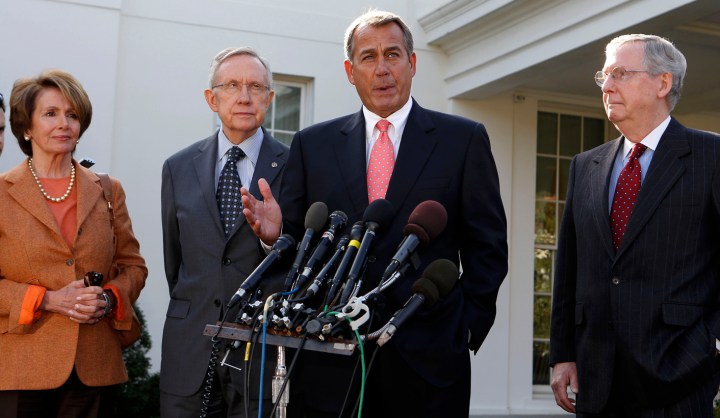Newsdeck
ANALYSIS: Fiscal cliff deal sours US tax reform outlook

Prospects for a 2013 overhaul of the U.S. tax code have faded after last week's "fiscal cliff" fight, with Democrats still pushing to raise more government revenue by closing tax breaks and Republicans arguing that the tax debate is over. By Kim Dixon and Kevin Drawbaugh.
The stand-off is crushing any modest post-election hopes that Washington could summon the political will needed for a comprehensive clean-up and simplification of the tax system.
In particular, the toxic atmosphere is denting any hopes of an overhaul of the corporate tax system by cutting the 35 percent rate, one of the highest in the world, while getting rid of a large number of tax breaks and shelters that mean many companies pay a much lower effective rate.
“Maybe there will be some breakthrough I can’t imagine…I just don’t see it right now,” said Bob McIntyre, head of Citizens for Tax Justice, a left-leaning tax think tank, who helped shape the last major tax reform – 26 years ago.
Some tax experts, economists and analysts now fear 2013 could witness a series of narrow agreements made in the face of imminent crises, far from the “grand bargain” some had seen as possible before the stop-gap deal on New Year’s Day.
“I suspect the deal has reduced the odds of fundamental tax reform this year,” said Donald Marron, director of the Tax Policy Center, a think tank, and a former senior economic adviser to Republican President George W. Bush.
Few things impose more cost and confusion on the economy than the complex, ever-shifting tax code. It has not been rewritten since 1986, when Republican President Ronald Reagan and congressional Democrats teamed up to raise taxes on business, cut them on everyone else and closed many loopholes.
Lawmakers from both parties have agreed for years that another overhaul is badly needed. The tax-writing committees in Congress held several hearings last year intending to lay the groundwork for a big push on tax reform in 2013.
Then came the frantic deal hatched a week ago by Vice President Joe Biden and Senate Republican Leader Mitch McConnell to avert the sharp tax increases and severe spending cuts threatened by the “fiscal cliff.”
Dubbed Biden-McConnell, the pact raised ordinary income taxes on household incomes over $450,000 and protected wage incomes below that level from tax hikes. These steps fulfilled campaign promises made by President Barack Obama and represented a defeat for Republicans who had fought tax hikes of any kind.
RUM, RACE TRACKS AND RESTAURANTS
Biden-McConnell also extended tax breaks for NASCAR race tracks, for Puerto Rican rum output, for film and television production, and for retail and restaurant improvements, among other small tax expenditure provisions – reminding Americans of how riddled the tax code is with special favors.
No mention was made in the deal of ending tax breaks long criticized by Obama, such as the “carried interest” provision that lets senior managers of private equity firms pay the lower capital gains tax rate on much of their income. His Republican opponent in last year’s presidential election, Mitt Romney, had benefited from that provision because of his earlier role as co-founder of Bain Capital.
At the same time, Biden-McConnell put off for two months deep spending cuts known as the “sequester” and did next to nothing to reduce the deficit.
The next test of whether Congress is able to do more than patch things over for a few weeks will come in late February and early March, when the “sequester” returns; the government again hits its borrowing limit; and funding for the government expires. All three will require congressional action.
Looking toward that, McConnell on Sunday ruled out raising tax revenues on top of the Biden-McConnell tax hikes and said the full focus must now be on spending cuts to curb the deficit.
“The tax issue is finished. Over. Completed,” McConnell, of Kentucky, said on ABC’s “This Week With George Stephanopoulos.”
Republicans are seeking cuts in the Medicare healthcare program and the Social Security pension program as a condition for raising the borrowing limit. Obama has said he will not negotiate over this. Democrats have vowed to keep pushing for more tax revenue, as well as spending cuts, to curb deficits.
House of Representatives Democratic Leader Nancy Pelosi, on CBS’s “Face the Nation,” said Democrats want “everything on the table from the standpoint of closing loopholes … Special subsidies for big oil, for example, $38 billion right there.”
CORPORATE CODE EYED
Many in the business community want a cut in the corporate income tax rate. Few corporations actually pay that rate, thanks to tax breaks they use to lower their effective rates, sometimes to zero. But the rate is among the world’s highest.
The White House unveiled a corporate tax plan in February that has gathered dust for months. Obama has agreed to a lower corporate rate and pledged to pursue that. Beyond such general commitments, however, the details get complicated.
Multinational corporations have pushed for years for a new system to allow them to bring back profits earned overseas at a zero or very low rate of U.S. tax, b u t companies with chiefly domestic markets are less committed.
Citizens for Tax Justice, a non-profit research and advocacy group, has estimated that 290 major corporations have collectively held nearly $1.6 trillion in profits outside the United States at the end of 2011. As long as these earnings are parked offshore, these Fortune 500-ranked companies do not have to pay corporate income tax on them.
House Ways and Means Committee Chairman Dave Camp, a Michigan Republican, has a plan to revise international corporate taxation, but business groups have been unable to agree on a key detail that would get Democrats on board: how to prevent further movement of businesses to other countries.
Moreover, corporate lobbyists readily admit that cutting corporate taxes while raising individual taxes – not only on high-income earners, but also on wage earners with the expiration last week of Obama’s brief payroll tax holiday – would not be a winning political argument with voters.
“An essential ingredient to reform is an agreement on how much tax the system needs to collect,” said Clint Stretch, former counsel for Congress’ Joint Committee on Taxation.
The “fiscal cliff” deal did not produce that, he said. “Republicans will likely dig in harder on no more new taxes.” DM
Photo: Speaker of the House John Boehner speaks to the press after a bipartisan meeting with U.S. President Barack Obama to discuss the economy in the Roosevelt Room of the White House November 16, 2012. Also pictured are (L-R) House Minority Leader Nancy Pelosi, Senate Majority Leader Harry Reid and Senate Minority Leader Mitch McConnell. REUTERS/Larry Downing


















 Become an Insider
Become an Insider